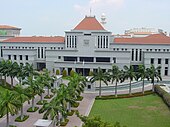
The president of India is the head of state of the Republic of India. The president is the nominal head of the executive, the first citizen of the country, as well as the commander-in-chief of the Indian Armed Forces. Droupadi Murmu is the 15th and current president, having taken office from 25 July 2022.

Royal assent is the method by which a monarch formally approves an act of the legislature, either directly or through an official acting on the monarch's behalf. In some jurisdictions, royal assent is equivalent to promulgation, while in others that is a separate step. Under a modern constitutional monarchy, royal assent is considered little more than a formality. Even in nations such as the United Kingdom, Norway, the Netherlands and Liechtenstein which still, in theory, permit their monarch to withhold assent to laws, the monarch almost never does so, except in a dire political emergency or on advice of government. While the power to veto by withholding royal assent was once exercised often by European monarchs, such an occurrence has been very rare since the eighteenth century.
An appropriation , also known as supply bill or spending bill, is a proposed law that authorizes the expenditure of government funds. It is a bill that sets money aside for specific spending. In some democracies, approval of the legislature is necessary for the government to spend money.

The President of the Republic of Singapore is the head of state of the Republic of Singapore. The office of president is largely ceremonial, with much executive authority excercisable by the Cabinet or any Minister authorised by the Cabinet. Nonetheless, the president enjoys several reserve powers, such as withholding assent to certain supply bills and revoking high-ranking public office appointments, including that of the Chief Justice, Attorney-General, Chief of Defence Force and Commissioner of Police. The incumbent President is Halimah Yacob, who was sworn-in on 14 September 2017. She is also the first female president in the country's history.
In many states with political systems derived from the Westminster system, a consolidated fund or consolidated revenue fund is the main bank account of the government. General taxation is taxation paid into the consolidated fund, and general spending is paid out of the consolidated fund.

The National Audit Office (NAO) is an independent Parliamentary body in the United Kingdom which is responsible for auditing central government departments, government agencies and non-departmental public bodies. The NAO also carries out value for money (VFM) audits into the administration of public policy.
In the Westminster system, a money bill or supply bill is a bill that solely concerns taxation or government spending, as opposed to changes in public law.
An Australian federal budget is a document that sets out the estimated revenues and expenditures of the Australian Treasury in the following financial year, proposed conduct of Australian government operations in that period, and its fiscal policy for the forward years. Budgets are called by the year in which they are presented to Parliament and relate to a financial year that commences on the following 1 July and ends on 30 June of the following year, so that the 2022 budget brought down in May 2022 relates to the 2022/23 financial year.

The Parliament of Singapore is the unicameral legislature of Singapore, along with the President of Singapore. Largely based upon the Westminster system, the Parliament is made up of Members of Parliament (MPs) who are elected, as well as Non-constituency Members of Parliament (NCMPs) and Nominated Members of Parliament (NMPs) who are appointed. Following the 2020 general election, 93 MPs and two NCMPs were elected to the 14th Parliament. Nine NMPs will usually be appointed by the president.
The Ministry of Finance is a ministry of the Government of Singapore responsible for managing the fiscal policies and the structure of the economy of Singapore.
This is a brief description of the lawmaking procedure in India.
A Consolidated Fund Act is an Act of the Parliament of the United Kingdom passed to allow, like an Appropriation Act, the Treasury to issue funds out of the Consolidated Fund.

There are three general sources of Singapore law: legislation, judicial precedents, and custom.
An Appropriation Act is an Act of the Parliament of the United Kingdom which, like a Consolidated Fund Act, allows the Treasury to issue funds out of the Consolidated Fund. Unlike a Consolidated Fund Act, an Appropriation Act also "appropriates" the funds, that is allocates the funds issued out of the Consolidated Fund to individual government departments and Crown bodies. Appropriation Acts were formerly passed by the Parliament of Great Britain.

The powers of the president of Singapore are divided into those which the president may exercise at their own discretion, and those they must exercise in accordance with the advice of the Cabinet of Singapore or of a minister acting under the general authority of the Cabinet. In addition, the president is required to consult the Council of Presidential Advisers (CPA) when performing some of their functions. In other cases, the president may consult the CPA if they wish to but is not bound to do so.

The Fiscal Responsibility and Budget Management Act, 2003 (FRBMA) is an Act of the Parliament of India to institutionalize financial discipline, reduce India's fiscal deficit, improve macroeconomic management and the overall management of the public funds by moving towards a balanced budget and strengthen fiscal prudence. The main purpose was to eliminate revenue deficit of the country and bring down the fiscal deficit to a manageable 3% of the GDP by March 2008. However, due to the 2007 international financial crisis, the deadlines for the implementation of the targets in the act was initially postponed and subsequently suspended in 2009. In 2011, given the process of ongoing recovery, Economic Advisory Council publicly advised the Government of India to reconsider reinstating the provisions of the FRBMA. N. K. Singh is currently the Chairman of the review committee for Fiscal Responsibility and Budget Management Act, 2003, under the Ministry of Finance (India), Government of India.

The Ministry of Finance, abbreviated MOF, is a ministry of the Government of Malaysia that is charged with the responsibility for government expenditure and revenue raising. The ministry's role is to develop economic policy and prepare the Malaysian federal budget. The Ministry of Finance also oversees financial legislation and regulation. Each year in October, the Minister of Finance presents the Malaysian federal budget to the Parliament.
The Scottish budget is an annual Act of the Scottish Parliament, giving statutory authority to the Scottish Government for its revenue and expenditure plans. For the financial year 2016/17 the budget was approximately £33.18 billion.

Collins v Minister for Finance[2016] IESC 73; [2017] 1 ILRM 65; [2017] 3 IR 99, is a reported Irish Supreme Court case in which it was held that the Minister for Finance did not breach his power in issuing promissory notes under the Credit Institutions Act 2008, which was found to be constitutional. Collins' appeal was dismissed by the Supreme Court, which concluded that, “a Minister for Finance can spend any amount of money they deem necessary in an emergency without going back to the Dáil and we will be challenging that in the Dáil itself.” The case thus legalised emergency measure to deal with Ireland's financial crisis. This was a case in which "the matters described" were of "national importance."

The Contingencies Fund Act 2021 is an act of the Parliament of the United Kingdom which allowed for a temporary increase in the maximum capital of the United Kingdom's contingency fund from 2%, as set out in Section 1 of the Contingencies Fund Act 1974, to 12%. It was introduced by Chancellor of the Exchequer Rishi Sunak in response to the ongoing effects of the COVID-19 pandemic.












